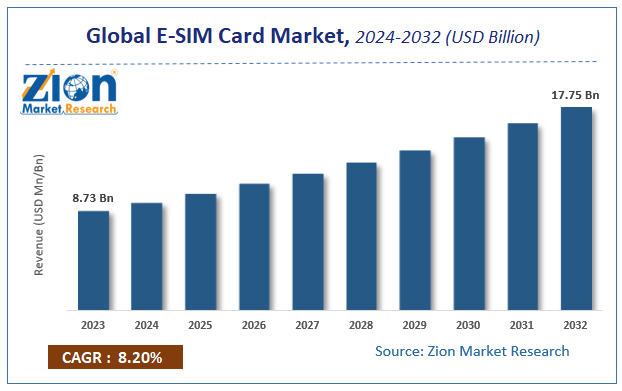
The eSIM (Embedded SIM) card market is a rapidly growing sector within the telecommunications industry, driven by advancements in mobile technology, the rise of IoT (Internet of Things) devices, and increasing consumer demand for seamless connectivity. Here’s an overview of the eSIM card market

1. Definition and Overview
- eSIM (Embedded SIM): An eSIM is a digital SIM that is embedded directly into a device, allowing users to connect to a mobile network without the need for a physical SIM card. Unlike traditional SIM cards, eSIMs are reprogrammable, enabling users to switch carriers or manage multiple profiles without changing the physical card.
- Market Overview: The eSIM card market has gained significant traction in recent years, with adoption in various devices such as smartphones, tablets, wearables, and IoT devices. The technology offers greater flexibility for consumers and enterprises, enabling easier network switching, better security, and support for multiple carriers on a single device.
2. Market Segments
The eSIM card market can be segmented based on application, end-user, vertical, and region:
- Applications:
- Smartphones: Increasingly adopted in premium smartphones, offering users flexibility to choose or switch carriers without a physical SIM swap.
- Wearables: eSIM technology is widely used in smartwatches and fitness trackers, enabling cellular connectivity without needing a paired smartphone.
- Tablets and Laptops: eSIMs provide cellular connectivity for tablets and laptops, making them more versatile for users who need internet access on the go.
- Automotive: eSIMs are being integrated into connected cars for telematics, navigation, and in-car Wi-Fi services.
- IoT Devices: eSIMs are critical for IoT applications, providing reliable, secure, and scalable connectivity for devices across various industries.
- End-Users:
- Consumers: Individual users who benefit from the convenience of eSIMs in smartphones, wearables, and other personal devices.
- Enterprises: Businesses that deploy eSIM-enabled devices for workforce mobility, IoT applications, and global operations.
- Verticals:
- Telecommunications: eSIM technology is transforming the telecom industry by enabling new business models, such as network-agnostic devices and global connectivity solutions.
- Automotive: Car manufacturers are incorporating eSIMs to offer enhanced connected services.
- Healthcare: eSIMs are used in connected medical devices for patient monitoring and telemedicine.
- Consumer Electronics: eSIM adoption in wearables, tablets, and laptops is growing rapidly.
- Manufacturing and Logistics: IoT devices with eSIMs are used for asset tracking, remote monitoring, and supply chain management.
- Geographical Segments:
- North America
- Europe
- Asia-Pacific
- Latin America
- Middle East & Africa
3. Market Drivers
Several factors are driving the growth of the eSIM card market:
- Rising Demand for Connected Devices: The proliferation of smartphones, wearables, and IoT devices is fueling the demand for eSIM technology.
- Advancements in IoT: The need for secure, scalable, and reliable connectivity in IoT applications is boosting eSIM adoption.
- Convenience and Flexibility: eSIMs offer users the ability to switch carriers without needing a physical SIM card, providing greater convenience and flexibility.
- Support from Major OEMs: Leading device manufacturers, such as Apple and Samsung, are increasingly integrating eSIM technology into their products, driving market growth.
- Global Roaming and Connectivity: eSIMs simplify global roaming by allowing users to switch networks seamlessly when traveling, supporting global connectivity solutions.
4. Challenges
- Limited Carrier Support: Not all mobile carriers support eSIM technology, which can limit its adoption in certain regions.
- Security Concerns: While eSIMs offer improved security over traditional SIMs, they also raise concerns about data privacy and the potential for cyber-attacks.
- Consumer Awareness: Awareness and understanding of eSIM technology are still relatively low among consumers, which can slow adoption.
- Regulatory Issues: The deployment of eSIM technology may face regulatory challenges in certain regions, particularly around issues of network neutrality and carrier lock-in.
5. Key Players
Some of the leading players in the eSIM card market include:
- Gemalto NV (a subsidiary of Thales Group)
- STMicroelectronics
- NXP Semiconductors
- Infineon Technologies AG
- Giesecke+Devrient Mobile Security GmbH
- Deutsche Telekom AG
- Sierra Wireless, Inc.
- Apple Inc.
- Samsung Electronics Co., Ltd.
- Qualcomm Technologies, Inc.
6. Market Trends
- Increasing Adoption in Consumer Electronics: eSIM technology is rapidly gaining ground in consumer devices such as smartphones, tablets, and wearables.
- IoT Expansion: The growing number of IoT devices, especially in sectors like healthcare, automotive, and industrial automation, is driving demand for eSIMs.
- Support from Telecom Operators: More telecom operators are adopting eSIM technology to offer flexible, multi-carrier options and to support the global IoT ecosystem.
- Integration with 5G: eSIM technology is poised to benefit from the global rollout of 5G networks, offering faster, more reliable connectivity for a wide range of devices.
- Regulatory Developments: Governments and regulatory bodies are increasingly recognizing the importance of eSIM technology, leading to more standardized frameworks for its deployment.
7. Future Outlook
The eSIM card market is expected to grow significantly in the coming years, driven by the increasing demand for connected devices and the expansion of IoT applications. The continued integration of eSIM technology into smartphones and other consumer electronics, coupled with the ongoing rollout of 5G networks, will further accelerate market growth. Additionally, as more telecom operators and regions adopt eSIM standards, the technology will become more mainstream, enabling new business models and consumer experiences.
Would you like more detailed information on any specific aspect of the eSIM card market?
Contact :
US OFFICE NO +1 (302) 444–0166
US/CAN TOLL FREE +1 (855) 465–4651
Email: sales@zionmarketresearch.com
read other reports :
https://www.linkedin.com/pulse/blood-plasma-fractionation-market-newest-report-size-s3obf
https://www.linkedin.com/pulse/virtual-reality-healthcare-market-size-latest-reports-2tpuf
https://www.linkedin.com/pulse/bone-growth-stimulation-devices-market-201-reports-79kdf
https://www.linkedin.com/pulse/2028-latest-report-outdoor-furniture-market-size-business-jb6df
https://www.linkedin.com/pulse/white-spirit-market-newest-report-size-booming-insights-lnqof
https://www.linkedin.com/pulse/2022-2028-global-wax-market-size-company-marketinsightsbiz-jlugf



